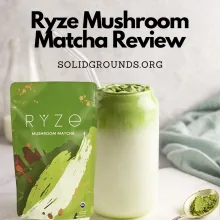What Is Mushroom Coffee? | Solid Grounds
Mushroom coffee is a trendy beverage that blends regular coffee with extracts and powders from medicinal mushrooms like reishi, cordyceps, chaga, lion’s mane, and turkey tail. These functional mushrooms are considered adaptogens that help the body adapt to stress and offer potential benefits such as immune support, stress relief, and cognitive enhancement.
Mushroom coffee has an earthy, savory flavor and generally contains less caffeine than regular coffee, providing a smoother, more balanced energy boost. While generally considered safe, it may cause allergic reactions or interact with medications, and caution is advised for pregnant or breastfeeding women. Quality brands use sustainable sourcing and third-party testing, and mushroom coffee can be enjoyed as an occasional indulgence for a unique, health-conscious twist on a cup of coffee.
Our #1 Recommended Mushroom Coffee | Our #2 Recommended Mushroom Coffee |
 |  |

Mushroom Coffee: The Adaptogenic Beverage Blending Coffee and Medicinal Mushrooms
In the ever-expanding world of functional foods and beverages, mushroom coffee has emerged as one of the trendiest brews in recent years. This unique beverage blends the beloved coffee bean with extracts and powders from various medicinal mushroom species, creating an energizing yet health-promoting elixir that its proponents claim offers benefits extending far beyond a regular cup of joe.
What Exactly is Mushroom Coffee?
At its core, mushroom coffee is essentially regular coffee fortified with functional mushroom ingredients like reishi, cordyceps, chaga, lion’s mane and turkey tail. These mushrooms have been used for centuries in traditional Chinese and Ayurvedic medicine for their wide-ranging reputed therapeutic properties.
Brands formulating mushroom coffee typically utilize extracts, powders or tinctures derived from the fruiting bodies and mycelium of these mushrooms. Dual extraction methods are often employed to capture both water and alcohol-soluble compounds.
In addition to the medicinal mushrooms, other functional ingredients like adaptogens (e.g. ashwagandha, rhodiola), MCT oils, cacao, and spices are commonly included to boost the health profile and flavor.
The ingredient blends are combined with high-quality arabica or robusta coffee beans and roasted to create an unconventional but distinctly rich and savory cup. Drinking mushroom coffee provides the familiar energy boost from caffeine along with the purported benefits of the functional mushroom varieties.
Popular Mushroom Varieties and Their Benefits
The mushrooms used in these beverages are considered adaptogens – compounds that help the body adapt to mental, physical and environmental stressors. Here are some of the most common varieties and their potential advantages:
Reishi – Used for thousands of years in Eastern medicine, reishi contains compounds like triterpenoids believed to have anti-inflammatory, antioxidant and immune-modulating effects. Some research indicates it may help manage stress, anxiety and fatigue.
Cordyceps – Prized for its energy-boosting properties, cordyceps contains molecules that may improve aerobic capacity and endurance. Other studies suggest it has anti-aging and immune-enhancing potential.
Chaga – Rich in antioxidants like melanin, chaga has traditionally been used for immunity, inflammation and regulating blood sugar levels. Modern research is exploring its effects on cancer and metabolic disorders.
Lion’s Mane – Known as the “brain mushroom,” lion’s mane contains compounds like hericenones and erinacines that stimulate the growth of brain cells. It shows promise for improving cognition, memory and neurological health.
Turkey Tail – With its ability to activate immune cells, turkey tail mushroom has displayed anti-cancer and infection-fighting capabilities in studies, in addition to metabolic and gut health benefits.
Each of these mushrooms contains a unique symphony of bioactive compounds that target different physiological systems and pathways. When combined with coffee, they aim to create a perfectly balanced, whole-body boost.
How Does Mushroom Coffee Differ From Regular Coffee?
Beyond the obvious difference of medicinal mushrooms, mushroom coffee distinguishes itself from a typical cup of coffee in a few key ways:
Flavor – Instead of the bright acidity characteristic of arabica coffee, mushroom coffee has an earthy, woody, umami-rich flavor reflective of its mushroom components. Cacao powder is sometimes added to balance and complement this savory taste.
Caffeine Content – While caffeine levels vary between brands, mushroom coffee is generally lower in caffeine than a standard cup. Many report a smoother, less jittery buzz.
Nutrition – Mushrooms are nutrient-dense foods containing various B vitamins, minerals, fiber and unique antioxidants. This provides an additional nutritional punch compared to brewed coffee alone.
Effects – Consumers often describe the effects as more balanced and sustained energy without the mid-morning crash and anxious feelings associated with coffee. The adaptogens promote a sense of calm focus.
Production, Buying and Brewing
In mushroom coffee production, whole dried mushrooms or extracted mushroom powders are infused into the coffee beans before or during the roasting process. This ensures thorough integration of flavors and compounds.
For consumers, mushroom coffee is most commonly sold in powdered form or instant packets to be mixed with hot water or your choice of milk. Some brands do offer whole bean options as well. Quality brands utilize third-party testing of both their mushrooms and coffee to verify purity and safety.
Proper storage is key to preserve freshness and potency. Sealed pouches or airtight containers kept at room temperature or in the freezer work best.
Brewing methods follow similar principles to regular coffee – steeping in hot water and adjusting ratios to your desired strength. Mushroom coffee can be enjoyed black or with enhancers like oatmilk, honey, MCT oil, or spices like cinnamon.
Notable Brands:
Four Sigmatic – A pioneering brand and one of the most popular options, offering both mushroom coffee powders and whole beans.
Mud\Wtr – Focused on earthy, full-bodied brews, Mud\Wtr’s line includes mushroom coffee, cacao mixes and more.
Om Organic Mushroom – Uses whole, organic U.S.-grown mushrooms and adaptogens in their instant coffee packets.
Real Mushrooms – Offers mushroom extract powders to add to your favorite coffee. Also sells whole roasted mushroom coffee beans.
Potential Downsides and Considerations
While considered safe for most people when consumed in moderation, there are a few potential downsides and considerations with mushroom coffee:
Allergic Reactions: Those with known mushroom allergies should avoid these beverages. Allergic reactions like rashes, nausea or breathing difficulties are possible, though quite rare.
Medication Interactions: Some of the bioactive compounds in medicinal mushrooms have the potential to interact with certain prescription medications. Consult your doctor if taking any medications.
Pregnancy/Breastfeeding: There is limited data on the safety of medicinal mushrooms for pregnant or breastfeeding women, so caution is advised for these populations.
Sustainability: As demand for mushroom coffee has risen, concerns over sustainable and ethical sourcing of wild or cultivated mushroom ingredients have emerged. Research brand practices to make informed decisions.
The Bottom Line on Mushroom Coffee
In summary, mushroom coffee offers a distinctive brew that layers invigorating coffee with the purported health advantages of revered adaptogenic mushrooms. Consumed in moderation, it may provide a smoother mental and physical boost beyond regular coffee.
However, it’s important to select high-quality brands, be mindful of any potential sensitivities, and consult medical professionals if you have specific health concerns. Approach mushroom coffee as an occasional indulgence rather than a daily driver.
When safely incorporated into a balanced diet and lifestyle, mushroom coffee serves as a creative and health-conscious alternative to satisfy coffee cravings with a unique twist of nature’s medicine.
Our #1 Recommended Mushroom Coffee | Our #2 Recommended Mushroom Coffee |
 |  |
FAQs and Answers
Are there any negative side effects or health risks from drinking mushroom coffee regularly?
There are few reported negative side effects from drinking mushroom coffee regularly, but there are a couple potential health risks to keep in mind:
- Blood thinning – Some compounds in ingredients like chaga and reishi may inhibit blood clotting and act as natural blood thinners. This could increase the risk of bleeding problems especially when combined with pharmaceutical blood thinners. Those with bleeding disorders should exercise caution with mushroom coffee.
- Immune effects – The immune-boosting effects of turkey tail, reishi and other shrooms can potentially cause autoimmune issues in those predisposed. Though rare, overstimulation of the immune system could trigger increased inflammation. Moderation is key.
- Medication interactions – As mentioned in the article, some mushroom compounds may interact with prescription meds like antidepressants and diabetes drugs that are metabolized through the liver’s cytochrome P450 pathway. Consulting a doctor can identify any medication-specific risks.
- Digestive upset – Some people may experience digestive discomfort like nausea, gas or diarrhea, especially when consuming strong mushroom coffee brews on an empty stomach. Starting slow and with food can help mitigate GI issues.
So while mushroom coffee is generally well-tolerated, these possible health risks are worth noting. Moderation, caution with meds, and awareness of personal tolerances can help reduce likelihood of negatives.
What is the shelf life for mushroom coffee products? How long do they stay fresh and retain potency?
The shelf life for mushroom coffee products can vary depending on the format and storage method, but general guidelines are:
Powdered mushroom coffee blends – Usually around 12-18 months shelf life. The powders may start losing flavor and potency after a year in storage. Keeping sealed packs refrigerated or frozen can prolong to 2 years.
Instant mushroom coffee packets – Around 1 year sealed shelf life. The finely ground coffee absorbs odors and flavors more over time. Refrigeration extends to 18 months.
Whole bean mushroom coffee – Up to 2 years stored in airtight containers at room temp, and up to 3 years refrigerated or frozen. Beans stay fresher longer than grounds.
Dried whole mushrooms – Kept cool and dry, most harvested mushrooms last 6-12 months before noticeable declines in active compounds. Reishi and chaga may last up to 3 years stored properly.
Mushroom extracts/tinctures – Liquid mushroom extracts typically last 3-4 years unopened, and 1-2 years refrigerated after opening, before potency fades.
So checking ‘best by’ dates, optimal storage methods, and proper packaging can help mushroom coffee products retain maximum freshness and effectiveness over their shelf life. Powders and grounds are generally more perishable than whole beans or dried mushrooms.
Is mushroom coffee safe for children or teenagers to drink? What about for pregnant women?
Mushroom coffee is generally not recommended for children or teenagers, and caution is advised for pregnant or breastfeeding women. Here’s some more detailed information:
Children & Teenagers:
There have been no scientific studies examining mushroom coffee safety specifically for children or teenagers. Since their bodies are still developing, the effects of functional mushrooms are difficult to predict. As such, most experts advise against regular mushroom coffee consumption for kids and adolescents as a precaution.
Occasional small amounts are unlikely to be an issue, but until more pediatric research emerges, parents should exercise caution and moderation. Stick to less potent mushroom ingredients, limit overall caffeine intake for age group, and monitor any side effects.
Pregnancy & Breastfeeding:
Due to lack of definitive safety studies, most doctors and health agencies advise pregnant/nursing mothers to avoid mushroom coffee or any supplements containing medicinal mushrooms and adaptogens.
Their chemical makeup means there is a chance of interfering with hormonal function, uterine contractions, development of the fetus, or passage through breastmilk.
While risks are unconfirmed, limiting mushroom coffee until after pregnancy and breastfeeding is the most prudent approach while more data is gathered. Checking with a doctor is also advised.
So out of an abundance of caution, mushroom coffee cannot be deemed completely safe for children, teenagers, or expectant/nursing mothers at this time. More research is still needed.
How does the cost of mushroom coffee compare to regular coffee? Is it more expensive?
Yes, mushroom coffee does tend to be more expensive than regular coffee. There are a few reasons for the higher cost:
- Specialty ingredients – The medicinal mushrooms, adaptogens, cocoa, MCTs etc. used in mushroom coffee blends are relatively expensive compared to basic coffee beans. These specialty ingredients often must be organically sourced and ethically wild-harvested as well.
- Processing – There are additional steps involved in manufacturing mushroom coffee, including dual-extraction of mushrooms, infusing beans, quality control testing, ensuring no cross-contamination for food sensitivities, and third-party lab testing. This adds to production costs.
- Supply and demand – The recent surge in popularity of mushroom coffee has increased demand faster than supply for some of the mushroom varieties used, also raising prices. Limited global supply networks for rare medicinal mushrooms further constrain costs.
- Brand hype – As a trendy new specialty product, some mushroom coffee brands inflate prices via flashy marketing and direct-to-consumer subscription models compared to basic commodity coffee.
On average, mushroom coffee runs $1-$2 per serving compared to $0.20-$0.60 for home-brewed conventional coffee. But fans tout mushroom coffee as a value-added functional beverage worth the price premium for the extra benefits.
Can you recommend specific mushroom coffee brand products for people new to trying it? Which are the best beginner options?
Here are some top mushroom coffee recommendations for beginners:
- Four Sigmatic Ground Mushroom Coffee – This is one of the most popular and widely available mushroom coffee blends. It mixes arabica beans with cordyceps and chaga for a balanced, smooth introduction.
- Whole Earth Farms Mushroom Coffee – Featuring a custom blend of three mushroom varieties alongside fair trade coffee, this is an affordable and gentle entry point with a light flavor.
- Real Mushrooms Lion’s Mane Coffee – Using organic lion’s mane extract infused into Colombian beans, this option targets brain health and focus for those new to mushroom coffee.
- OM Organic Mushroom Coffee with Cordyceps – A certified organic blend combining coffee with immune-supporting cordyceps mushroom powder makes this a quality starter choice.
- SoulFuel Mushroom Coffee Starter Kit – They offer convenient sampler packs to try different mushroom ingredients before buying bags/tins for an ideal introductory option.
These products all combine modest amounts of well-studied mushroom varieties with flavorful single-origin coffees to create balanced, enjoyable brews for those looking to dip a toe into mushroom coffee. Easy to acquire online or at specialty markets too!






